1992 United States presidential election
Democratic governor Bill Clinton of Arkansas defeated incumbent Republican president George H. W. Bush and independent businessman Ross Perot of Texas.Bush had alienated many conservatives in his party by breaking his 1988 campaign pledge not to raise taxes, but he fended off a primary challenge from paleoconservative commentator Pat Buchanan without losing a single contest.The billionaire Perot launched an independent campaign, emphasizing his opposition to the North American Free Trade Agreement and his plan to reduce the national debt.His re-election was considered very likely; several high-profile candidates, such as Mario Cuomo and Jesse Jackson, refused to seek the Democratic nomination.Senator Al Gore from Tennessee refused to seek the nomination due to the fact his son had been struck by a car and was undergoing surgery and physical therapy; however, Tom Harkin, Paul Tsongas, Jerry Brown, Larry Agran, Bob Kerrey, Douglas Wilder, and Bill Clinton chose to run as candidates.Nebraska senator Bob Kerrey was an attractive candidate based on his business and military background, but made several gaffes on the campaign trail.Tsongas won the New Hampshire primary on February 18, but Clinton's second-place finish, helped by his speech labeling himself "The Comeback Kid", energized his campaign.Tsongas dropped out after finishing third in Michigan; however, Brown began to pick up steam, aided by using a phone number to receive funding from small donors.However, the success of the opposition forced the moderate Bush to move further to the right than in the previous election, and to incorporate many socially conservative planks in the party platform.[19] Perot crusaded against the North American Free Trade Agreement (NAFTA), and internal and external national debt, tapping into voters' potential fear of the deficit.He compounded this damage by eventually claiming, without evidence, that his withdrawal was due to Republican operatives attempting to disrupt his daughter's wedding.Unlike in 1988, Fulani failed to gain ballot access in every state, deciding to concentrate some of that campaign funding towards exposure of her candidacy and the Party to the national public.Initially Howard Phillips had hoped to successfully entice a prominent conservative politician, such as the former senator Gordon J. Humphrey from New Hampshire, or even Patrick Buchanan who at the time had only been mulling over running against President Bush (he would officially declare in December 1991).No one, however, announced any intention to seek the Taxpayers Party nomination; Buchanan himself in the end endorsed President Bush at the Republican National Convention in Houston.At the convention, which was attended by delegates from thirty-two states and Washington, D.C., Phillips received 264 votes on the first ballot, while Albion Knight was approved as his running mate by acclamation.Under the campaign slogan "God, Guns and Gritz" and publishing his political manifesto "The Bill of Gritz" (playing on his last name rhyming with "rights"), he called for staunch opposition to what he called "global government" and "The New World Order", ending all foreign aid, abolishing federal income tax, and abolishing the Federal Reserve System.His run on the America First/Populist Party ticket was prompted by his association with another far-right political Christian talk radio host, Tom Valentine.During his campaign, part of Gritz's standard stump speech was an idea to pay off the national debt by minting a coin at the Treasury and sending it to the Federal Reserve.During August 1992, Gritz attracted national attention as mediator during the government standoff with Randy Weaver at Ruby Ridge, Idaho.His running-mate was James Bevel, a civil rights activist who had represented the LaRouche movement in its pursuit of the Franklin child prostitution ring allegations.Ballot access: Michigan, New Jersey (33 Electoral) John Yiamouyiannis, a major opponent of water fluoridation, ran as an Independent under the label "Take Back America".[78] Clinton gave his acceptance speech on July 16, 1992, promising to bring a "new covenant" to America, and to work to heal the gap that had developed between the rich and the poor during the Reagan/Bush years.[82] As Bush's economic edge had evaporated, his campaign looked to energize its socially conservative base at the 1992 Republican National Convention in Houston, Texas.At the convention, Bush's primary campaign opponent Pat Buchanan gave his famous "culture war" speech, criticizing Clinton's and Gore's social progressiveness, and voicing skepticism on his "New Democrat" brand.Initially, Perot's return saw the Texas billionaire's numbers stay low, until he was given the opportunity to participate in a trio of unprecedented three-man debates.Also, this was the first time since 1964 that the following nine states had voted Democratic: California, Colorado, Illinois, Montana, Nevada, New Hampshire, New Jersey, New Mexico, and Vermont.Effective Democratic TV ads were aired showing a clip of Bush's 1988 acceptance speech in which he promised "Read my lips … No new taxes."The end of the Cold War allowed old rivalries among conservatives to re-emerge and meant that other voters focused more on domestic policy, to the detriment of Bush, a social and fiscal moderate.To garner the support of moderates and conservative Democrats, he attacked Sister Souljah, an obscure rap musician whose lyrics Clinton condemned.In addition, he organized significant numbers of young voters and became a symbol of the rise of the baby boomer generation to political power.


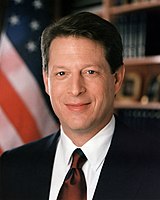





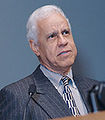

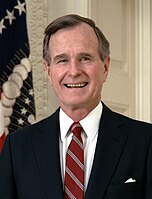
















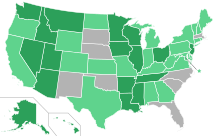


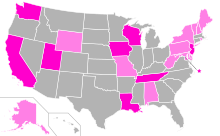



1992 United States electionsElectoral CollegeBill ClintonGeorge H. W. BushRoss PerotDemocraticRepublicanIndependentArkansasAl GoreDan QuayleJames Stockdaleelectoral votesPresidential electionsWhite Houseconservativesprimary challengepaleoconservativePat BuchananGulf WarMario Cuomo1992 Democratic primariesDemocratic Leadership CouncilSuper TuesdayJerry BrownMassachusettsPaul TsongasTennesseean independent campaignNorth American Free Trade Agreementnational debtrecession in the spring of 1991Ronald Reaganforeign policydissolution of the Soviet UnionCold Warfocused on the economyelectoral votehighest shareEponymsFamilyFoundationClinton Bush Haiti FundOne America AppealHonorsPublic imageSexual assault and misconduct allegationsBibliographyPost-presidencyGovernorshipsTroopergateElectionsPresidencytimelineTransitionInaugurationssecondPresidential libraryExecutive actionspardonsForeign trips1995–1996 shutdownWhitewaterWhite House travel officepardonRepublican RevolutionOperation Infinite ReachYugoslaviaImpeachmenteffortsClinton–Lewinsky scandalHouse inquirySenate trialPoliciesEconomic1993 health care planPRWORABalanced Budget ActGun controlClinton DoctrineDayton Agreement1994 Crime BillOne America InitiativeFederal judgesSupreme Court candidatesprimariesconventiondebateselectionU.S. Senator from TennesseeTenureClinton administration1st inauguration2nd inaugurationInformation technologyFlorida recountBush v. GoreselectionEnvironmental activismAn Inconvenient TruthAwards1992 Democratic Party presidential primaries40th and 42ndGovernor of ArkansasU.S. SenatorCampaignTom HarkinBob KerreyDouglas WilderGovernorCaliforniaNebraskaVirginiaJesse JacksonLarry Agranterm limitscampaign finance reformflat income taxNew DemocratGennifer Flowers60 MinutesHillary ClintonNew Hampshire primarySouth DakotaWashingtonNew York City's Jewish community